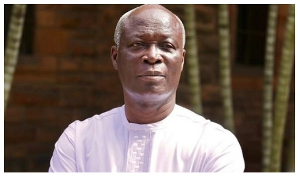The National Coordinator for the District Roads Improvement Programme (DRIP), Nii Lante Vanderpuye, has assured that President John Dramani Mahama’s government will only recruit into the public sector based on actual national and sectoral needs, not political considerations.
Speaking on the government’s employment policy direction, Mr. Vanderpuye said the administration was committed to maintaining fiscal discipline and ensuring that recruitment was guided by verified labour demands identified through comprehensive planning under the National Democratic Congress (NDC) manifesto.
“When we were doing our manifesto, we did a very good job on our job needs. So as of today, I can tell you that the John Dramani Mahama government would not just get up and recruit because we have assessed and we know for the various sectors, the number of people that need to be recruited this year, next year, and the next two years”
Nii Lante Vanderpuye, National Coordinator for DRIP
Mr. Vanderpuye explained that the NDC administration’s recruitment strategy was designed to ensure sustainable employment practices aligned with national economic realities. He said the process would avoid the waste and inefficiencies that had characterised politically motivated recruitment exercises in the past.

“I know it would be a bit frustrating to some of our party people who would think that we have come to power, and as such, we need jobs all of a sudden. Some would get the jobs, but I am saying that because we have determined the sort of numbers we need in the various sectors and would operate with that”
Nii Lante Vanderpuye, National Coordinator for DRIP
He emphasised that all recruitments would be carefully coordinated with the Ministry of Finance to prevent unbudgeted expenditure and ensure that every new hire contributed meaningfully to national productivity. According to Mr. Vanderpuye, the goal is to break away from recruitment according to political whims and caprices and reap all the added benefits.
“I think we need to sanitize the system. First, we should look at the effects of such recruitment on the nation before considering political aggrandisement,” he added. Mr. Vanderpuye said the administration’s employment plan reflects President Mahama’s commitment to managing public resources responsibly.
It was also a reflection of the government’s desire to effectively address unemployment in a structured and data-driven manner.

Salary Delays and Administrative Inefficiencies
The DRIP Coordinator also expressed concern over recurring salary delays affecting teachers, nurses, and other public sector workers, describing the problem as a structural failure that must be addressed urgently.
“It has been occurring frequently. In this Fourth Republic, it has become like a norm that teachers would be recruited, nurses would be recruited, sometimes even doctors, and for months, they wouldn’t be receiving their salaries. It is worrying”
Nii Lante Vanderpuye, National Coordinator for DRIP
He attributed the issue to a structural defect, pointing to inefficiencies in the administrative and payroll systems. He thus called for reforms to ensure that newly recruited workers are promptly captured in the national database so that their “benefits would be paid to them as when they are due.”
Mr. Vanderpuye’s remarks come amid growing frustration among newly recruited health and education professionals who have reportedly gone several months without pay. He said fixing the administrative lapses that cause such delays was essential to sustaining morale and efficiency in the public service.
The DRIP Coordinator maintained that reforms in recruitment and payroll systems must go hand-in-hand with broader efforts to align employment policies with national priorities, as he reiterated that the Mahama administration’s approach to job creation would “prioritise sustainability and accountability over short-term political gains.”

According to him, these reforms are part of President Mahama’s broader economic stabilization agenda aimed at restoring efficiency across public institutions while maintaining macroeconomic balance.
READ ALSO: Government’s ‘Big Push’ Project Draining Oil Sector Funds – PIAC























